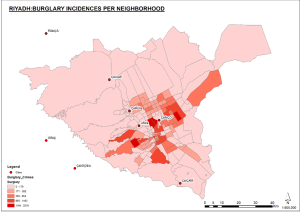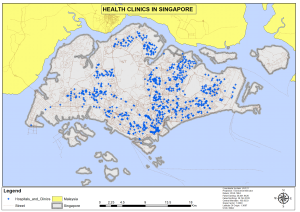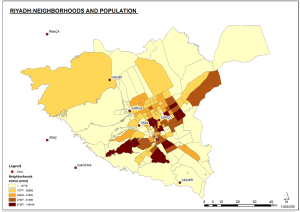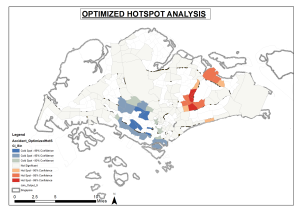GIS Capstone projects are a way for students to gain experience with Geographic Information Systems. Topics could be anything from exploring how street maps influence public policy, to mapping the effects of fracking on water quality.
GIS Capstone project ideas are the low-hanging fruit of earth. Just because they’re easy to find doesn’t mean they’ll be easy to pick. That is precisely why we have compiled a list of topics that students may choose from.
Sources of topic ideas for a GIS Capstone project
GIS Capstone project ideas are the most important part of any GIS project. This is because the GIS Capstone project is the final product of a student’s GIS coursework. Therefore, it is important to have good topic ideas that will be valuable to the community and help them build their skillset.
There are many ways to generate good topic ideas for a GIS Capstone project. Some of them include:
- Information from internet searches
- Secondary sources such as books, journal articles, and magazines
- Data analysis through use of ArcGIS Desktop software
- Social media research
- sources from experts in the field
- brainstorming session with other team members
You can choose to explore any one of the following topics in GIS for your capstone project:
- Geospatial data management
- Spatial analysis and visualization
- Geocoding and geotagging
- Remote sensing and photogrammetry
- Spatial data analytics
- ArcGIS programming, design and management
- Digital cartography
- Data collection and management
- Web mapping and web services
The GIS Capstone project is an opportunity for students to explore how GIS can be used in different ways. Some simple GIS Capstone Project Ideas include:
- Geospatial analysis of a specific topic or event
- Geospatial analysis of a place in the world
- Creating a map of your neighborhood
- Creating a map of your city
- Creating a map of your state
GIS Capstone project ideas For Students
The GIS Capstone project ideas listed below are some of the most popular topics that students like to work on. They can be used as a starting point for your project ideas or even as an inspiration for your own project idea.
- Land Use and Development: What does the future of land use look like in America? How does this relate to the state of our environment?
- The Correlation Between Temperature and Crime in Atlanta, Georgia.
- Quantifying Impact of Weather Condition on Travel Time.
- Exploration of Commuting Patterns in San Francisco Bay Area.
- Covid-19 Vulnerability Index for United States Counties.
- Measuring the Correlation Coeffecient Between Landsat 7 Provisional Surface Temperature and 2-Meter Air Temperature on Georgia Tech’s Campus.
- Canada lynx Potential Habitat Loss in the United States Due to Climate Change.
- A Text-Mining and GIS Approach to Understanding Transit Customer Satisfaction.
- Driving forces of land-use change in Cincinnati metropolitan area.
- Where do consumers who are most likely to purchase a guitar reside? Spatial analysis for small retail business marketing.
- Research of Commuting Patterns of the Atlanta-Sandy Springs-Roswell MS.
- Understanding the Impact of Social Vulnerability and Access to Resources on Health Outcomes.
- Social Deprivation to Crime Rates in Suffolk, Massachusetts & Fulton, Georgia.
- User Based House Suitability Evaluation.
- The Deprivation and Food Deserts of Southeastern U.S.
- Assessing Physical and Social Vulnerability to Wildfires in Western North Carolina.
- Strategic Market Deployment Planning: Farm-to-Table Logistics Platforms.
- Study on Equity of Accessibility of Hospitals and Future Potential Site Selection of Hospitals within Fulton County, GA.
- Analyzing Atlanta Counties’ Function Based on Transportation Data.
- Updated Travel Assistance.
- Calculating Change in Regional Accessibility Due to Autonomous Vehicles.
- Economic Shifts Along the US-Mexico Border: Investigating the Changes in Location Quotient at the Block Level in Four US Border Cities from 2004-2015.
- Highways, Urban renewal, and patterns in the Built Environment: Exploring Impacts on Atlanta Neighborhoods.
- Modeling Transit Dependency Index and the Analysis on the Intersecting Transit-Dependent Groups-A Spatial Microsimulation Approach.
- Global Warming: What is global warming and why is it so important? What are some solutions that we could take in order to help mitigate global warming?
- Healthcare: How do you think healthcare will change in the future? What do you think will be different about healthcare in ten years or two decades from now?
- Urbanization: What is the future of cities in America? How will technology and population growth affect cities?
- Aging: How can we address issues related to aging in America? What are the best practices for addressing issues surrounding aging?
- The Future of Transportation: Will transportation change drastically in the future, or will it stay relatively similar?
- Climate Change: What are the best practices for addressing climate change in America?
- Technology: How can technology be used to address some of the causes of climate change?
- Energy: What types of sustainable energy sources are available and what is their potential for impact on future transportation?
- Food Security: How can America address its food security issues?
- Aging: How may aging issues be addressed in America, such as the availability of affordable housing and healthcare facilities, older Americans’ access to public transportation, and guaranteed government benefits like Social Security and Medicare?
- Religion: What are the factors that shape religious demographics in America, including age distribution, gender, and ethnic groups?
- Education: How much of an impact does education have on an individual’s economic status in America?
- Income inequality: How big is income inequality in America?
- Housing : How many homes are available for purchase in America?
- Social mobility: What types of factors have an impact on social mobility in America?
- Demographics: How is the size and composition of the United States changing, and how do these changes affect its culture?
- Immigration: What effects does immigration have on American society and culture?
- Race relations: What are some of the reasons why race relations in America are strained, such as discrimination against minorities by law enforcement agencies and hateful political rhetoric from presidential candidates?
- What Statistical and Spatial Relationships Exist Between Health Insurance, Race, Income, and Education in the State of Georgia Immediately Before and After Implementation of the Affordable Care Act?.
- Urban Development Site Suitability Application..
- Predicting the Past: A model to Locate Archaelogical Resources, Inform Planning, and Enrich the Future of the Atlanta Region..
- Effects of Urban Storm Water Runoff on the Natural Environment, Effects of the Natural Environment upon People, and Greenspace Solutions to Remediate Potential Flooding in the Proctor Creek Watershed: The Case of Proctor Creek Watershed, and the Designation of a Partial Greenway Multipurpose Corridor Between Midtown and Downtown.
- Ethnic Communities and Economic Sustainability.
- A Future Energy Harvesting Scenario for Georgia Tech Campus Using Photovoltaic Solar Panels and Piezoelectric Materials.
- Habitat Suitability for the Frosted Flatwoods Salamander in Florida.Using SLAMM to Better Understand Sea Level Rise on the Francis Marion National Forest.
- Using GIS and Python for Assessment and Prioritization of Potential Transit Projects.
- Renewable Energy Alternatives for the Honouliuli Wastewater Treatment Plant, a GIS Suitability Analysis.
- Supporting Cancer Prevention Strategies Using Geospatial Analysis on HRSA Data.
- Metro Atlanta Rapid Transit Authority: A Simplified Topological Design for MARTA Bus Lines.
- Smart Cities and City Services; Integrating GIS for Resource and Operations Management.
- Using GIS to Identify Livable Communities for Aging Populations in Atlanta, GA.
- A Standardized Geodatabase Form for Cultural Resource Management.
- Using GIS to Predict Near-Future Car Accidents Location.
Why hire us to provide custom GIS Capstone projects?
When you are tasked with writing a GIS Capstone project, it can be difficult to know where to start. There are plenty of resources available to help you get started, but the best way to avoid wasting time is to hire someone who has already done it.
There are many reasons why people might want to hire someone else to do their GIS project for them. Some people might not have the time to do it themselves, while others might not have a background in GIS or geography.
We are GIS professionals with extensive experience in the field. We have a passion for what we do and strive to provide the best quality work. Our team is made up of experienced GIS professionals from different academic backgrounds. We use our skills and knowledge to create informative maps and deliver them on time. We can give you the best value for your money by providing you with professional quality maps that meet your specific needs.
The task of writing a GIS Capstone project can be daunting, but there is no need for you to struggle through it on your own. You can hire an experienced GIS Capstone writer and have them do all the hard work for you.






